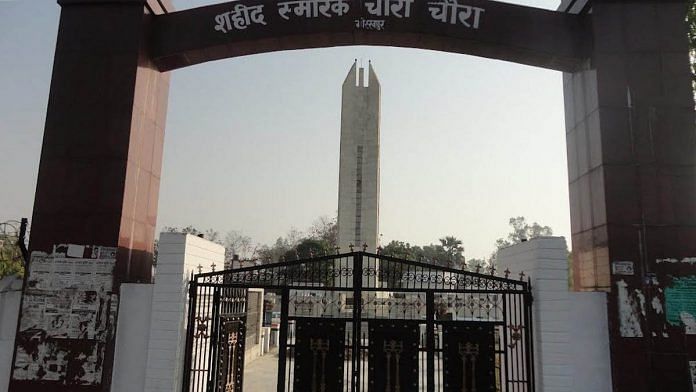New Delhi: On 4 February 1922, at the peak of Mahatma Gandhi’s Non-Cooperation Movement against the colonial administration, an incident in United Provinces’ (now Uttar Pradesh) Chauri Chaura village, in the Gorakhpur district, changed the course of the Indian Independence Movement.
After a group of protesters were thrashed by the police for mocking foreign cloth, meat and liquor, a mob gathered outside the police station in protest. The policeman fired at the mob, killing three people, and in retaliation, the mob set the station on fire, killing 23 policemen.
In response, Gandhi called off the movement, which was gaining a lot of momentum, and vociferously condemned the violence in Chauri Chaura to reinforce the principle of non-violence.
Now, 99 years after this incident, Prime Minister Narendra Modi will inaugurate the centenary celebrations of the incident via video conference Thursday. Celebrations have been planned in all 75 districts of Uttar Pradesh and will continue till 4 February next year.
Also read: Gandhi made first call for non-cooperation from St. Stephen’s but British didn’t storm campus
19 sentenced to death for Chauri Chaura
More than 200 protesters were put on trial by the British administration for the Chauri Chaura incident, and six of them died in police custody.
After an eight-month-long trial, 172 people were sentenced to death. The verdict met severe backlash after which the Allahabad High Court revised its judgment and sentenced 19 to death, 110 to life imprisonment and the remaining received long jail terms.
Gandhi’s decision to call off the Non Cooperation Movement after the incident, however, was not supported by many.
Leaders like Jawaharlal Nehru, Sardar Patel and Rajendra Prasad reluctantly accepted Gandhi’s call. Lala Lajpat Rai famously said on Gandhi’s decision: “Our defeat is in proportion to the greatness of our leader.”
Many people, especially from Chauri Chaura, are still of the opinion that Gandhi’s decision to call off the movement after one incident was unjustifiable.
“In Chauri Chaura, they didn’t just accept police brutality like in Jallianwala Bagh, unhone bhi jawab diya (they retaliated). It was the first and last event of its kind in the freedom movement,” said Ram Narain Tripathi, grandson of Meghu Tiwari, who was among the 19 hanged by theRam Narain Tripathi, grandson of Meghu Tiwari, who was hanged by the British.
Also read: Kalki — rebel Tamil literary giant who quit school to join Non-Cooperation Movement
Non-Cooperation Movement
The Non-Cooperation Movement was launched in 1920 in response to two key events in 1919 — the Rowlatt Act and the Jallianwala Bagh massacre.
Under the Rowlatt Act, political cases could be tried without a jury and the suspect detained for an indefinite period of time.
The Act had sparked widespread protests across the country and in April 1919, Gandhi had planned to visit Amritsar to join one such protest. However, he was stopped in Delhi and arrested on 10 April, along with other prominent leaders. This angered the people of Amritsar who took to the streets.
Following this, General Reginald Dyer was tasked with restoring order in the city and among other measures, a ban was put in place on public gatherings.
On 13 April 1919, General Dyer opened fire on a gathering of unarmed men, women and children at Jallianwala Bagh, killing hundreds. More than 10,000 people had gathered in the park to protest the British rule.
While official statistics note that 400 civilians died, the actual number is believed to be much higher.
The Jallianwala Bagh massacre marked a turning point in India’s history as well as Gandhi’s approach to independence. He now demanded purna swaraj or complete independence from the British.
The Non Cooperation Movement was the first step towards this total independence.
It was supposed to be non-violent movement wherein people would give up titles conferred upon them by the government, boycott government educational institutions, courts, government services, elections and not pay taxes.
Also read: This is why Mahatma Gandhi forgave General Dyer even after Jallianwala Bagh massacre



